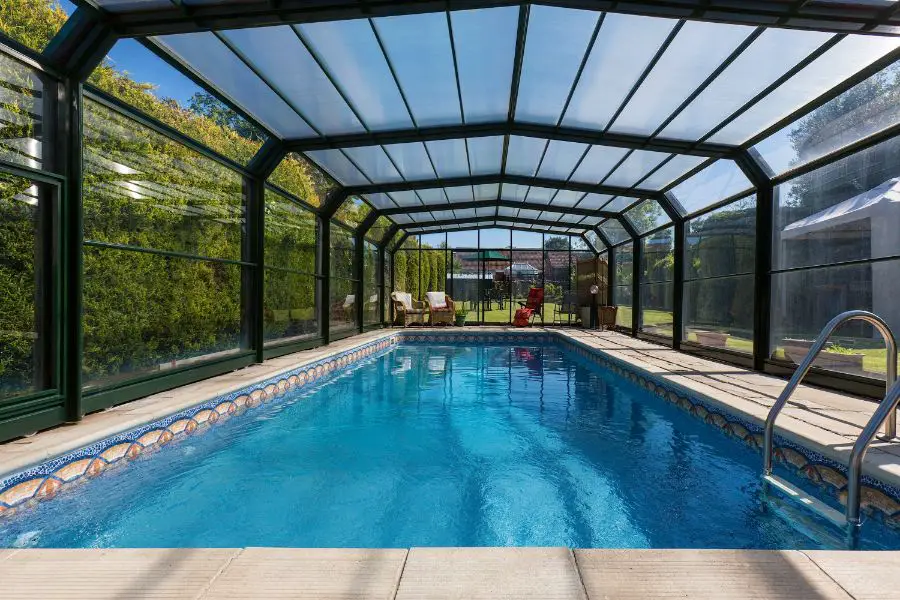Pool screens are helpful in keeping animals, insects, leaves, and debris out of the water, while still providing a sense of openness. Ultimately, a functional screen means more fun in the pool and less cleaning.
However, over time pool screens often get dirty accumulating mold and algae. That’s why they require cleaning regularly.
One of the most popular cleaning products around the house and pool is bleach. As you may know, bleach is made of sodium hypochlorite, which releases chlorine to remove growth such as algae.
While chlorine may help get surfaces spick-and-span, it can also be corrosive. Even just everyday splashing in the pool could allow chlorinated water to reach the pool enclosure.
This may lead you to wonder, “Will chlorine damage pool screens?”
If diluted properly, chlorine shouldn’t damage the pool screen itself. However, higher concentrations of chlorine will increase risk of damage to the metal framing and surrounding environment.
In this article, we’ll dive into situations where chlorine could damage your pool screen, and the necessary steps to prevent damage.
Will Chlorine Damage Pool Screens?
Pool screens are often made of fiberglass mesh with aluminum frames. When evaluating whether chlorine will cause damage to the enclosure, you will need to look at the effect on each of the materials individually: fiberglass and aluminum.
Fiberglass has great resistance against chlorine. In fact, fiberglass is often used as a pool structure, which further emphasizes its ability to handle chlorine.
On the other end of the spectrum, we have aluminum which is not always compatible with chlorine. Exposure to chlorine can cause the aluminum to become oxidized, leading to a white chalky appearance and eventual corrosion.
Depending on the type of protective coating on the aluminum, it may or may not be affected by normal exposure to chlorinated pool water. A powder coating or enamel coating will better protect the metal from chlorine’s corrosive nature.
If the protective coating on the aluminum has worn away, then the bare metal is more likely to be affected by chlorine concentrations as low as 2 ppm. For reference, most chlorinated pools are maintained with a free chlorine level of up to 4 ppm.
Depending on the state of the aluminum framing, chlorine bleach can still be a consideration for cleaning if used properly.
How To Use Chlorine on Pool Screens
Pool screens may acquire a green hue over time, especially in areas with high humidity. This happens due to accumulating algae and mold that thrive in humid locations.
Chlorine based cleaners are great at killing off this growth, where other gentler cleaners may not excel.
There are some precautions to consider before you start cleaning your pool screens using chlorine, which include:
- Protecting the surrounding plants and flower beds by wetting them down beforehand
- Wearing protective gear, like rubber gloves, safety goggles, and face shields
- Wearing old clothes that you don’t mind getting dirty or ruined
- Avoiding mixing chlorine with any other products
Cleaning Pool Screens with Chlorine
Mildew, mold, and algae look hideous, and they can cause discoloration to your enclosure. Additionally, they pose health risks for people with asthma or allergies.
Chlorine will kill most organic matter and breaks down all that gunk clinging to your pool screens. That’s why it’s considered an excellent overall cleaning product.
Here’s a step-by-step guide on how to use chlorine to clean your pool screens:
1. Turn off all nearby electronics that could get wet during the cleaning.
2. Use a leaf blower and aim it at the screens to remove as much loose debris as possible.
3. Prepare a diluted chlorine solution by mixing four parts of water and one part of household bleach in a bucket.
4. Apply the cleaning solution to your pool screens using a soft-bristled brush and an extension pole if needed.
5. Scrub the screens gently with the soft-bristled brush.
6. Use a hose sprayer to rinse the pool screens thoroughly. A power washer is also an option, but you’ll need to keep the pressure setting low to avoid damage to the screen.
7. Work from the top down, spraying water and washing the outside of your enclosure.
8. Move to the inside and rinse the screens, as mentioned in the previous step.
9. Rinse the surrounding plants again and remove any debris that fell into the pool with a skimmer.
10. Dry off the enclosure with a cloth or allow it to air dry.
After hosing everything down completely, you’ll have confidence that there’s no more lingering chlorine that will corrode the aluminum pool enclosure.
Other Cleaners for Pool Screens
While chlorine is a great cleaner, there are other options that are less corrosive and more environmentally friendly.
A mild mixture of dish soap and water is great at removing grime from pool screens. While it doesn’t have the lethal effects on organic growth, it can help dislodge them from the screen so that they can be washed away by water.
If you’re looking for a cleaning solution that falls between dish soap and chlorine, then it’s worth considering vinegar and water. Vinegar has acetic acid, which can kill many types of mold.
Regardless of which cleaning solution you choose, you can follow similar steps described above to get your pool screen looking fresh again.
How to Protect Pool Screens from Chlorine
With pool screens or mesh material being made of fiberglass, they should be resistant to normal levels of chlorine. But, it’s more likely the aluminum that will be most susceptible to damage from chlorine.
Applying a non-abrasive automobile wax is a simple means to protect the aluminum from not only chlorine, but also UV. Even if your framing is powder-coated, the wax will help increase the longevity.
A routine inspection of the pool enclosure is also useful for early detection of trouble spots. If you notice that the protective coating –whether paint or powder coating– on the aluminum is chipped, it may be time to take some action:
You can attempt to use sandpaper to eliminate minor nicks in the finish.
While most paint will not adhere well to powder-coated metal, the use of an epoxy primer and enamel paint can help. Alternatively, seek help from a professional if you’re looking to repair the powder-coating like new.
If all else fails, using wax on the damaged area can help protect the bare metal from chlorine. You’ll just need to ensure the wax is reapplied periodically for protection.
What Damages Pool Screens?
Damage can happen to either the frames or the screening of your pool enclosure.
Metal screens can develop dents and bends. They can also rust or get ripped. Those rips and holes can quickly make the screen rather useless, as animals and insects will find their way into the area.
Things that can damage your pool screens include:
1 – Aging
A really common reason that causes damage to your pool screens is simply aging. This is especially true when they aren’t well maintained; pool screens can rust and become brittle over time.
That’s why cleaning the rust off your pool screens protects them from damage caused by corrosion.
2 – Wind and Storms
Storms can cause a lot of damage to your pool screens. Wind also can twist or break them.
Not to mention hailstorms that could cause dents and bends to your pool screens.
3 – Animals and Birds
Raccoons and squirrels can actually bite their way through your pool screens, especially if you have wooden frames installed.
Birds also can damage your pool screens if they perch on your enclosure. That’s because bird droppings have high acid content, which can cause corrosion to pool screens.
Final Takeaway
So, will chlorine damage pool screens? While fiberglass screens are mostly resistant to chlorine, the aluminum framing could experience damage.
If the aluminum has a solid protective coating, normal exposure of low chlorine concentration from pool water shouldn’t cause much concern. Bare aluminum can quickly become oxidized when in contact with chlorinated water.
While using chlorine bleach is an effective way to clean your pool screen when properly diluted, you may want to start with milder solutions such as dish soap or vinegar. The milder cleaners should help ensure longevity of the enclosure.
Now that you know whether pool screens can be damaged by chlorine, you may also be interested to learn whether chlorinated pool water will kill your grass.
Happy Swimming!
Husband and father of three (actually, four if you include the pool). I’m an avid DIY-er and weekend warrior that enjoys taking up new projects around the house to help us maximize leisure right at home. I enjoy researching and sharing various tips, tricks and knowledge to help others make their home an oasis.

